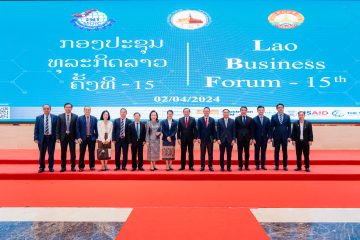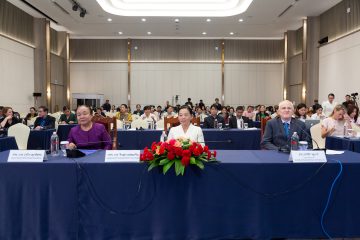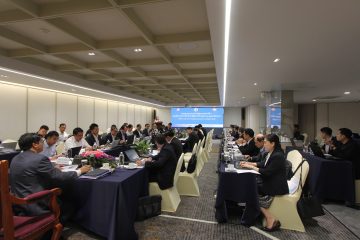MOIC organized an inter-ministerial task force for a licensing reform meeting under the implementation of PM Order 03
Vientiane, January 22, 2024. The 4th Annual Task Force Meeting on Business License Reform took place in the first-floor meeting room of the Ministry of Industry and Commerce, chaired by H.E. Mme. Chansouk Sengphachanh, Deputy Minister of Industry and Commerce and Chair of the Business License Reform Coordination Committee. The meeting included Deputy Ministers from line ministries, such as the Ministry of Justice, Ministry of Technology and Communication, and Ministry of Labor and Social Welfare. Representatives from the Ministry’s Permanent Security Office, along with relevant departments both within and outside the Ministry of Industry and Commerce, were also in attendance, totaling 125 participants.
The purpose of the meeting was to evaluate the implementation of the business license reform in 2023 and discuss the future work plan. The focus was on addressing outstanding issues, prioritizing the work plan, and enhancing collaborative efforts in 2024.
During the opening remarks, Mme. Chair commended the relevant sectors for their proactive efforts in improving licensing reform within their purview. Notably, many sectors proposed removing their activities from the controlled list, demonstrating a commitment to revising numerous regulations and legislation related to business license applications. This aims to streamline procedures, reduce unnecessary paperwork, and expedite license issuance, thereby enhancing the business environment in Lao PDR.
To ensure the successful implementation of Order No. 03/PM and achieve concrete results, Mme. Chair urged representatives from pertinent ministries to maintain close coordination. She also emphasized the importance of each sector conducting comprehensive research to reevaluate their activities and expedite the improvement of the license issuance process. Incorporating a risk-based approach to licensing by all sectors, Mme. Chair highlighted that not all business activities require licenses, which can be a burden to both the government and the private sector. Only high-risk businesses should require licenses, while low-risk sectors should have minimal requirements to operate. In addition, Mme. Chair recommended that sectors prioritize updating legal information pertaining to their reformed business licenses on the inventory business license portal website (www.bned.moic.gov.la).
The meeting proceeded with a brief report from the Director General of the Department of Enterprise Registration on the compilation of a list of activities within relevant sectors that require permission to operate, summarizing a total of 414 activities. This compilation serves as a fundamental reference for the private sector. The principles governing the issuance of enterprise certificates based on the revised Law on Enterprises were also presented at the meeting. It emphasized the separation of business establishment (enterprise registration) from the issuance of business licenses, and international principles and best practices aimed at improving the process of business license issuance and the associated management mechanism were also presented. The meeting concluded with great success.
In her closing remarks, the Deputy Minister emphasized the critical need for Laos to enhance its business environment in the face of numerous challenges. She underscored that such improvements are essential for fostering private investment, thereby fortifying the nation’s economic foundation. This aligns with the government’s strategic priority to shift the country from import dependency to import substitution and to enhance its export potential.
The meeting received support from the Lao PDR Competitiveness and Trade (LCT) project, implemented by the Ministry of Industry and Commerce. The project received technical and financial support from the World Bank and a multi-donor trust fund contributed by Australia, Ireland, and the United States. The project aims to eliminate barriers to private sector-led growth by improving the regulatory environment, lowering trade costs, and raising firm-level competitiveness.


